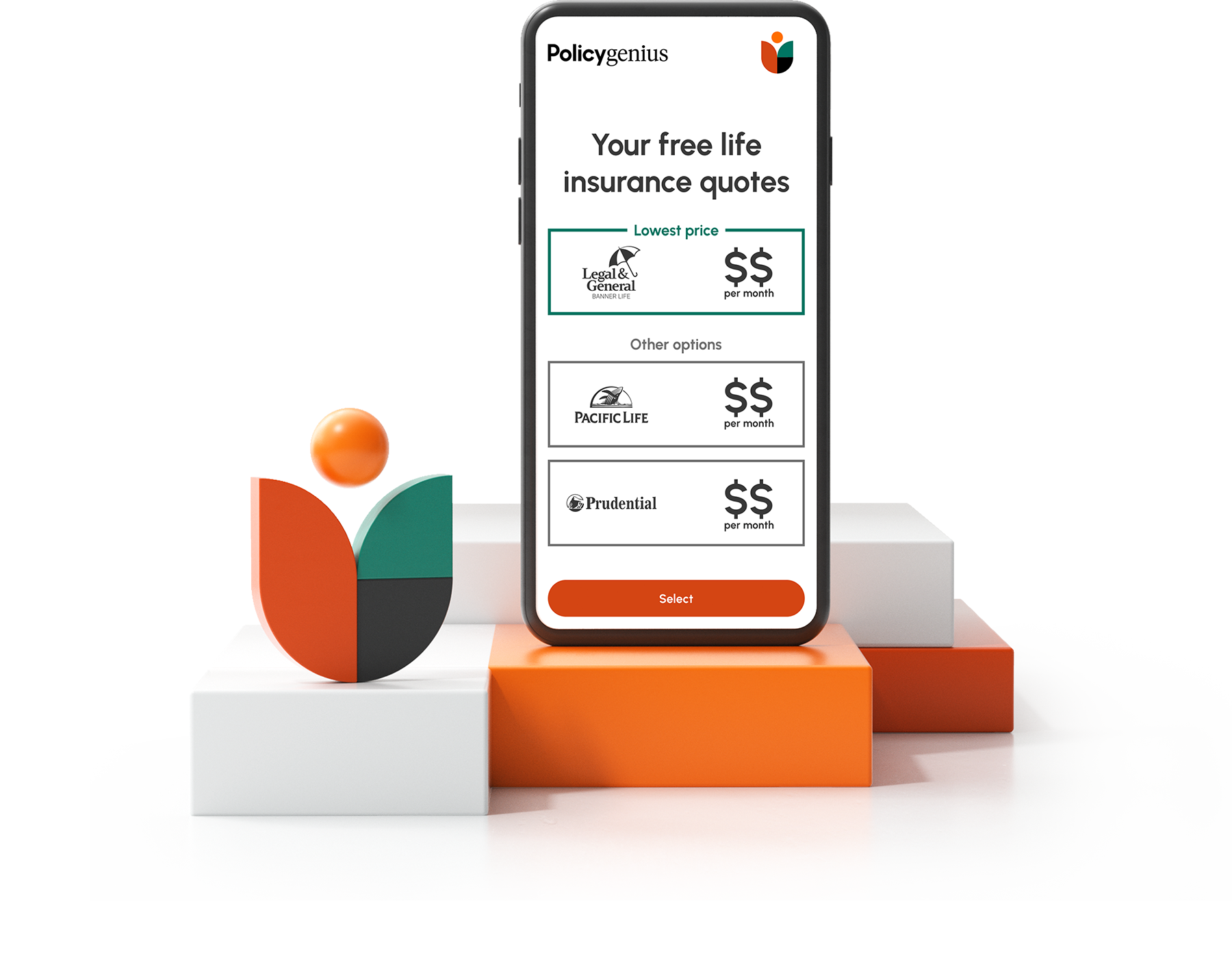What is life insurance?
The definition of life insurance is a contract where you make regular payments — also known as premiums — to an insurance company; in return, the insurance company pays a lump sum of money to your beneficiaries if and when you die while your policy is active.
A life insurance policy can last for a predetermined period of time (as it does with term life insurance) or until you die (as whole life insurance policies do).
Either way, life insurance is an easy and affordable way to provide a financial safety net for your loved ones, since it can cover any financial obligations they're still responsible for after your death — including a mortgage or children's expenses.
Who needs life insurance?
Anyone with financial obligations that their dependents would be responsible for in the event of their death should consider buying life insurance. For instance, a family of four may struggle to continue making mortgage payments after the death of a parent — unless a life insurance payout replaced their lost income.
Many people make life insurance plans after a major life event like getting married, having children, or buying a house, in order to financially protect their dependents. Here are some common examples of the kind of people who benefit most from life insurance.
Families: If you have family members in your household for whom you provide, it’s important to have life insurance to protect their quality of life.
New parents: After growing your family, it’s smart to evaluate your life insurance coverage to make sure your children are protected.
Anyone with dependents: If you have other dependents or expect to care for an aging family member, life insurance can help make sure their care doesn’t lapse in your absence.
Stay-at-home parents: Even though stay-at-home parents don’t bring home a traditional salary, they provide significant value in the form of housekeeping, cooking, and childcare, among other activities. If you’re a stay-at-home parent, life insurance can help replace your contributions to the household in the event you pass away.
Business owners: Life insurance can help your business partners pay estate taxes, buy out a partner, or hire a replacement for you if you die.
Young adults: Even if you don’t have any dependents yet, getting life insurance while young might be a smart move because that’s when it’ll be the cheapest. You can start planning for the future now and save money by locking in the cheapest rates.
Anyone over 60 years of age: Seniors can use life insurance to cover final expenses or to complement their estate planning strategy.
→ Read more about who needs life insurance and why
What factors affect life insurance quotes?
How do you get life insurance quotes online?
To get life insurance quotes, start by choosing where and how you’d like to compare quotes from different companies. Most insurers and marketplaces will ask you for a few pieces of information that affect your life insurance rates, such as your age, sex, and any health conditions. Then you’ll receive an estimate of what you can expect to pay, but your rate won’t be final until you officially apply and go through the underwriting process.
How to get life insurance quotes from Policygenius
You can compare quotes right now by using our cost calculator below to compare life insurance quotes from different companies for free — then connect with one of our licensed agents to get unbiased advice and find the best and most affordable options to fit your needs.
What type of life insurance policy do you need?
The type of life insurance you need depends on what kind of financial protection you’re looking for, as well as your budget. Below are the most popular types of life insurance.
Term life insurance
Term life insurance is the most popular type of life insurance coverage because it’s affordable and provides financial protection when you need it the most, usually during your peak earning years. Term life policies typically have a length between 10 years and 30 years, and they don't have any complex tax implications or restrictions.
How much does term life insurance cost?
On average, term life insurance will cost around $28 per month for a healthy 35-year-old buying a policy with a term of 20 years and a death benefit coverage amount of $500,000. Here are a few more average sample term life insurance rates for non-smokers.
Average monthly term life insurance rates for non-smokers
Age | Gender | $250,000 coverage amount | $500,000 coverage amount | $1 million coverage amount |
|---|---|---|---|---|
25 | Female | $14.39 | $21.01 | $32.53 |
Male | $17.26 | $27.13 | $43.73 | |
35 | Female | $16.71 | $25.76 | $42.01 |
Male | $18.88 | $30.79 | $51.05 | |
45 | Female | $28.90 | $48.43 | $86.32 |
Male | $35.84 | $61.49 | $112.47 | |
55 | Female | $61.86 | $111.35 | $206.69 |
Male | $84.59 | $153.76 | $281.13 |
Methodology: Sample monthly estimated rates are for male and female non-smokers with a Preferred health rating buying a 20-year, $250,000, $500,000, and $1,000,000 term life insurance policy. Life insurance averages are based on a composite of policies offered by Policygenius from Banner Life, Brighthouse Financial, Corebridge Financial, Foresters Financial, Lincoln Financial, Mutual of Omaha, Pacific Life, Protective, Prudential, Symetra, and Transamerica, and may vary by insurer, term, coverage amount, health class, and state. Not all policies are available in all states. Rate illustration valid as of 05/01/2023.
Whole life insurance
Whole life insurance is a type of permanent life insurance that lasts your entire life. It’s five to 15 times more expensive than term life, but comes with a cash value account separate from the standard death benefit. The cash value grows at a low interest rate set by your insurer, and is funded in part by the premiums you pay.
How much does whole life insurance cost?
On average, whole life insurance will cost $526 per month for a healthy non-smoking 35-year-old buying a policy with a $500,000 coverage amount. Here are a few more monthly whole life insurance rates for non-smokers.
Average monthly whole life insurance rates for non-smokers
Age | Gender | $250,000 coverage amount | $500,000 coverage amount | $1 million coverage amount |
|---|---|---|---|---|
25 | Female | $175 | $346 | $660 |
Male | $199 | $393 | $765 | |
35 | Female | $243 | $481 | $947 |
Male | $288 | $571 | $1,121 | |
45 | Female | $360 | $716 | $1,417 |
Male | $435 | $866 | $1,690 | |
55 | Female | $589 | $1,173 | $2,332 |
Male | $692 | $1,380 | $2,173 |
Methodology: Sample monthly rates for male and female non-smokers obtaining a $250,000, $500,000, and $1,000,000 whole life insurance policy fully paid up at age 100 through MassMutual. Not all policies available in all states. Rates will vary as specific circumstances will affect each customer’s rate. Rate illustration valid as of 05/01/2023.
Universal life insurance
Universal life insurance is a flexible type of permanent life insurance that allows you to increase or decrease how much you pay toward premiums. If you decrease how much you spend, the difference is withdrawn from your policy’s cash value. It’s best for high earners trying to build a nest egg without entering a higher income bracket.
No-medical-exam life insurance
No-medical-exam life insurance refers to policies that don’t require a medical exam for approval — you complete a health interview online or over the phone instead. Most no-medical-exam life insurance options are term policies that offer a faster application process for people with minor health conditions.
The most common types of life insurance, at a glance
Life insurance type | Coverage length | Best for ages | Medical exam required | Death benefit payout | Builds cash value | Premiums |
|---|---|---|---|---|---|---|
Term | 10 years to 40 years | 18-65 | Not always | $100,000+ | No | Fixed |
Whole | Life | 18-65 | Yes | $50,000+ | Yes | Fixed |
Universal | Life | 18-65 | Yes | $50,000+ | Yes | Flexible |
No-medical exam (term) | 10 years to 40 years | 18-60 | No | $100,000+ | No | Fixed |
Where to buy a life insurance policy
Once you’ve compared multiple quotes for life insurance, the next step is to buy your policy. You can buy a life insurance policy directly from a company, affiliated agents, or an independent broker.
Through an independent broker like Policygenius: We work for you, offer unbiased advice, and provide a wider array of quotes from many of the best life insurance companies on the market instead of just a single insurer. At Policygenius, we work with more than 10 different insurance companies and can help you easily compare and buy a policy online. If you want to get a full picture of all the coverage options available to you, we recommend this option.
Directly from the insurer: You can also work with a specific insurance company and apply through one of their agents. They’ll be familiar with that company’s products, but you’ll only be able to compare policies from that particular insurer.
Through an affiliated agent: Finally, you can work with an agent who is affiliated with one or more insurance companies. They’ll have access to those insurers’ product guides, but they might work on commission, which could influence their advice and the policies they offer you.




